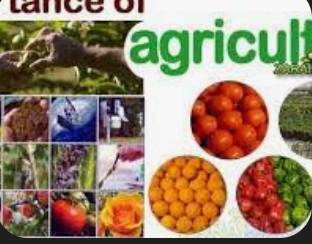.
Agriculture plays a vital role in driving economic growth and development. It serves as the backbone of many economies around the world. Here are some key points to consider:
1. Job Creation: Agriculture is a significant source of employment, especially in rural areas. It provides opportunities for farmers, farm workers, and those involved in related industries such as food processing and distribution.
2. Food Security: Agriculture ensures a stable and secure food supply for a nation's population. By producing enough food locally, countries can reduce their dependence on imports and ensure access to affordable and nutritious food for their citizens.
3. Economic Stability: A strong agricultural sector contributes to overall economic stability. It provides a stable income for farmers, stabilizes food prices, and reduces inflationary pressures.
4. Rural Development: Agriculture contributes to the development of rural areas by creating employment opportunities, improving infrastructure, and stimulating local economies. It helps to alleviate poverty and reduce income disparities between urban and rural areas.
5. Export Opportunities: Agricultural products are often major exports for many countries. By producing high-quality agricultural goods, countries can tap into international markets, generate foreign exchange, and boost their overall trade balance.
6. Value Chain Development: Agriculture forms the basis of various value chains, including food processing, packaging, transportation, and marketing. These value chains create additional economic opportunities and contribute to the overall growth of the economy.
7. Environmental Sustainability: Sustainable agricultural practices promote environmental conservation and the preservation of natural resources. By adopting techniques such as organic farming and efficient water management, agriculture can contribute to a greener and more sustainable future.
8. Innovation and Technology: The agricultural sector is constantly evolving, with advancements in technology and innovation. From precision farming to genetic engineering, these developments enhance productivity, improve crop yields, and drive agricultural growth.
9. Economic Diversification: Agriculture provides a platform for economic diversification. It can serve as a foundation for the development of agri-businesses, agro-tourism, and other related industries, contributing to a more diversified and resilient economy.
In conclusion, agriculture is a crucial sector that fuels economic growth. It not only ensures food security and job creation but also contributes to rural development, export opportunities, and environmental sustainability. By investing in agriculture and supporting farmers, countries can unlock the full potential of this sector and drive overall economic prosperity.



No comments yet
Be the first to share your thoughts!